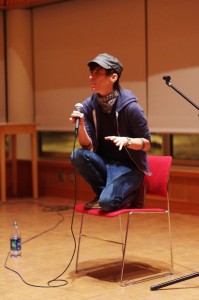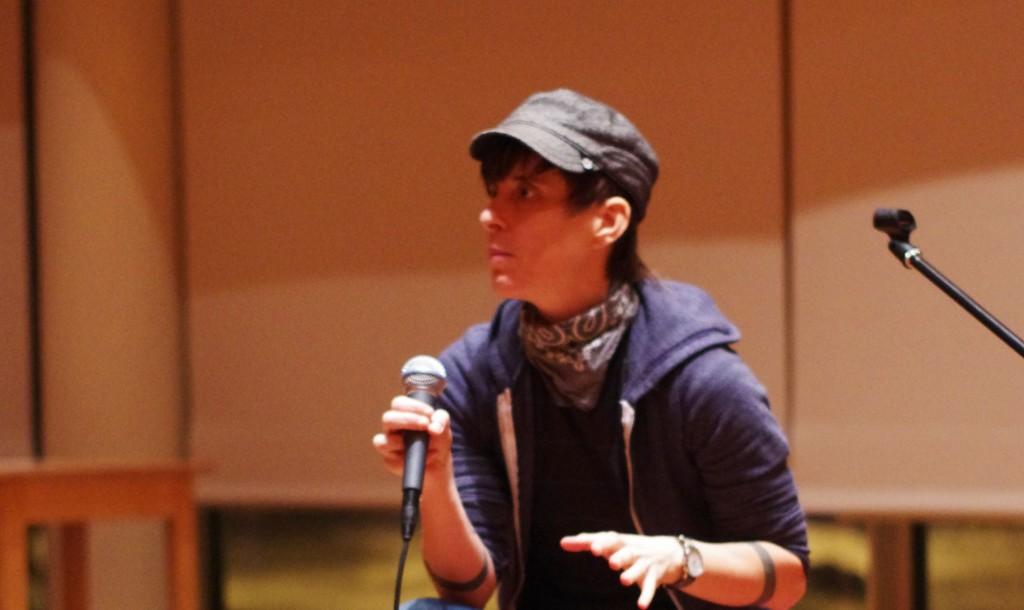By Christopher Squier
squierch@grinnell.edu
Andrea Gibson’s Monday evening spoken word performance was a spectacular combination of energy and gravity, in turn pummeling the audience with emotion and giving voice to unique and infrequently expressed experiences.
Almost exclusively progressing from one sobering topic to another, Gibson’s poetry ranged from discussions of bullying and mental health to war and discrimination.
For example, in her poem “For Eli,” Gibson spoke about the horror of war for everyone involved, with an incendiary denouncement of the depersonalization of war. In opposition to the broad topic, Gibson used poetry to share personal experiences about her friends and family and from her own life. In “For Eli,” Gibson discussed post-traumatic suicide and the post-war shock of adapting to everyday life, but for the most part focused on more minor details, such as the teddy bear Eli had tattooed near his wrist after the war.

“Eli’s mother traces a teddy bear onto the inside of my arm and says, ‘Not all casualties come home in body bags,’” Gibson recited.
Throughout the evening, very few poems broke free from the bittersweet atmosphere, although every poem contained enough beauty to sustain their pensive and somber subject matter. Even her love poems reflected a wide spectrum of emotion, particularly as a result of Gibson’s connection to Iowa—as she confided, her long term ex-girlfriend is Iowan.
Gibson herself is from Maine, although she now resides in Colorado, where she purportedly first tried her voice in open-mic and spoken word performance. As the winner of the first Women’s World Poetry Slam in 2008, Gibson has been recognized for her superb skill in poetry, in additional to receiving accolades for her poetry in similarly prominent poetry slams, including the National Poetry Slam and Individual World Poetry Slam.
Frequently featured in the media, Gibson’s poetry was featured on the BBC, Air America, C-SPAN, and Free Speech TV. Interestingly, in 2010, Utah state representative Christine Johnson read Gibson’s poem “Say Yes” in place of the regular morning prayer. It was decried for its queer themes, despite Gibson commenting that it was perhaps her only “not-gay” poem.
However, as a queer-rights activist, Gibson frequently writes and speaks about gender, sexuality and experiences with oppression, and some students in the audience recalled her reading spoken word with Katie Wirsing at last year’s Midwest LGBTQ College Conference (MBLGTACC).
On Monday, Gibson’s verses were laced with her own truths, displaying the trials and emotions of her life. She seemed integrated with her poetry, speaking honestly and opening about her life.
“I’ll tell you, these poems are my birthmarks, and I came this close to having them removed,” Gibson recited from her poem “Jellyfish.”
Performed to musical accompaniment written by her friends, Gibson’s poems combine syntax with symphony, providing a palpable mood through language, rhythm and ambient noise. During the question and answer session, Gibson described her writing process, which was an interesting, nontraditional way to think about composition.
Although her process has become more standardized and regulated than it once was, Gibson said she starts with a subject matter and a certain sound quality she wants, before inputting specific sentences and word choice. She hopes that the sound of the poetry arrives at the same meaning as the poem itself, so that even people outside of her language can hypothetically understand the message.
Often, Gibson moved from more serious thoughts to the petulance of the child version of herself to tell her stories. In her poem “Letter to a Playground Bully from Andrea (age 8),” she responded as she wishes she would have when bullied as a child, while in “I Sing the Body Electric,” she read:
“When I was seven, the man who played the bagpipes wore a skirt. He was from Scotland so I wanted to move there.”
Gibson’s glib tone often surfaced throughout the readings, evoking laughter, while other poems left the room silent and contemplative. Her poetry’s focus on gender and sexuality issues can be a wake-up call. She read one poem about LGBTQ victims who were burned to death, imagining their stories as if their ashes could speak:
“Write me down like this: say my ashes never made the news. Say the jury was full of shotguns and say the snow that fell on the tip of your tongue refused to melt away,” Gibson recited from her poem “Ashes.”



















































